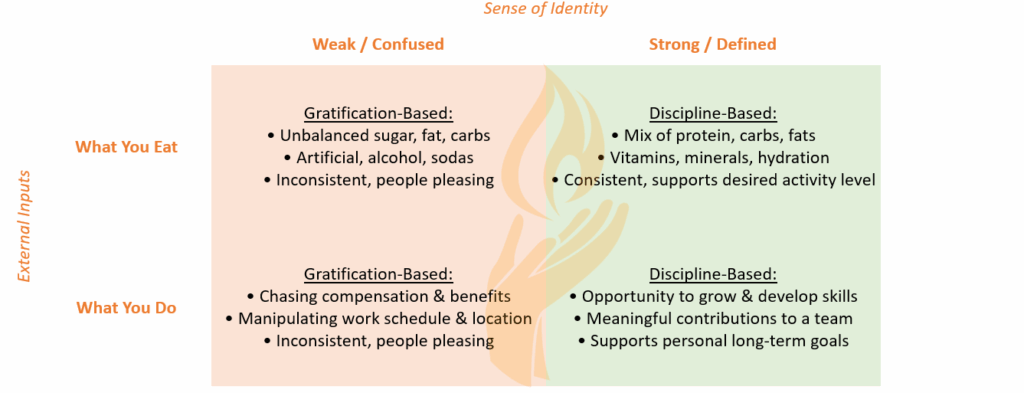“You are what you eat.” Every athlete knows the importance of nutrition. A marathoner should not be on the same diet as a bodybuilder. Similarly, an Olympic-level athlete cannot eat like an average 6-year-old and expect to compete. Their intake fuels their output.
What you eat à Who you are
An athlete who ignores their diet trades potential for convenience—neglecting nutrition means choosing to underperform. Eventually, underperformance leads the athlete to believe they are a bad athlete or not an athlete at all. Here, nutrition determines who is a high-performing athlete.
Who you are à What you eat
Successful athletes today know they can control what they eat and use their diet as an advantage to reach their potential. Calories and nutrition are tools to fuel the body for peak performance. An athlete who prioritizes nutrition unlocks their full potential – choosing a disciplined diet is a choice to excel. Notice the belief in their identity as a successful athlete comes first, then focus on their diet. It is not nutrition choosing who’s an athlete, it is the athlete choosing their nutrition.
“It puts food on the table.” Where and how you work is what feeds you. Like athletes, poor-performing professionals accept whatever food is convenient, while high-performing professionals are disciplined in choosing how they get their food.
What you do à Who you are
Choosing convenience is chasing the highest salary, pursuing the least amount of work, or jumping on a brand name. These professionals accept whatever an employer provides them so long as one of these surface-level needs is met. A professional who ignores work culture trades potential for convenience – neglecting work culture means choosing to underperform in the long run. Choosing a salary to find out long hours are required with no recognition. Choosing a brand name to find you are lost in a sea of bureaucracy. Believing the company’s promise that “employees are our most valuable asset” to find out they have a turnover rate 3x higher than anyone else in the industry. They offer leave and insurance benefits only to leave you covering most of the cost. In these scenarios, you will start thinking something is wrong with you and begin doubting your field or skill as you move from company to company or wallow in burnout.
Who you are à What you do
Humans are designed to fulfill a purpose. You have a unique calling and skillset. Choosing “how you get your food” means you look deeper at where and how you work. You look for a place that values psychological safety, allowing you to find your voice. You find a place that values professional development and provides opportunities to grow. You find a company that is transparent in its actions, enabling you to see how your work fits its mission. You find a purpose in your work, not allowing work to define your purpose. A professional who prioritizes workplace culture unlocks their full potential – choosing a healthy environment is a choice to excel. In this scenario, you are rewarded for your work, you experience progress and promotion, and you feel your work contributes to a purpose.
Don’t let the externals, the food you eat or the work culture, take away from or define who you are. Level up your career and life by using your identity to determine where and how you “eat.”


